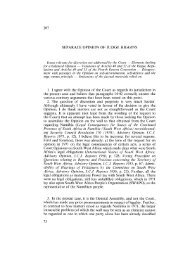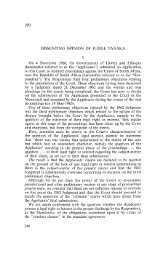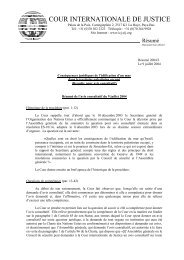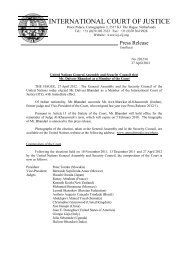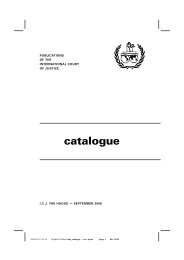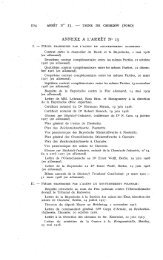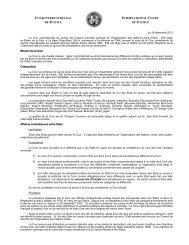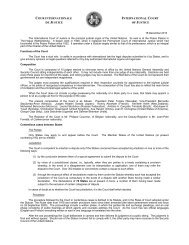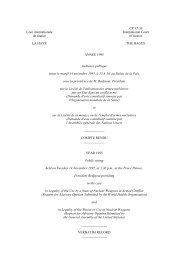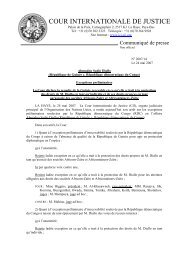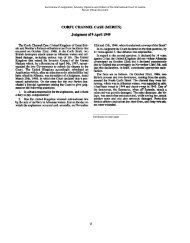botswana/namibia - Cour international de Justice
botswana/namibia - Cour international de Justice
botswana/namibia - Cour international de Justice
You also want an ePaper? Increase the reach of your titles
YUMPU automatically turns print PDFs into web optimized ePapers that Google loves.
712. The second solution is as follows. In reliance upon an eccentric version of the concept of<br />
indirect rule, the Namibian Memorial relies upon the authority of the Basubia chiefs in the<br />
Eastern Caprivi. Without any proof, it is asserted that the activities of the Chiefs and their<br />
subjects could generate title (for Germany in the period 1890 to 1914). This assertion does<br />
not, of course, take care of the issue of finding the source of a 'title believed in.' But the<br />
Namibian Memorial provi<strong>de</strong>s an answer: "... the chiefs, and in<strong>de</strong>ed all the Masubia, regar<strong>de</strong>d<br />
Kasikili Island as a part of their traditional territory." (p.92, para. 230). Elsewhere, the<br />
Namibian Memorial refers to an alleged 'Namibian/Masubia occupation and use of Kasikili<br />
Island" (p.102, para. 255).<br />
713. Thus the only source of a 'title believed in', once the Anglo-German Agreement is set<br />
asi<strong>de</strong>, is the traditional title of the Basubia, which (if it existed) antedated the Anglo-German<br />
Agreement of 1890. The Namibian Memorial in effect treats the traditional title of the<br />
Basubia as a type of jus cogens, which would automatically modify the application of the<br />
provisions of Article III of the Anglo-German Agreement in the Chobe district. The Namibian<br />
Government makes no attempt to explain how such a reference to traditional title could be<br />
compatible with contemporary <strong>international</strong> law of the period 1890 to 1914.<br />
714. The assumption that a carefully negotiated boundary treaty was subject to locally applied<br />
traditional title is one of quite remarkable novelty. However, such an assumption is the<br />
inevitable result of seeking to mount a case based upon prescription which involves a setting<br />
asi<strong>de</strong>, without any justification, of the provisions of the Anglo-German Agreement.<br />
715. There is thus an absence of proof of any legally valid 'genuine belief' in the existence of<br />
title. At this point, it is necessary to remind the <strong>Cour</strong>t that there is no proof (in any case) that<br />
the Basubia chiefs had authority to change the <strong>international</strong> boundary or that the island was<br />
subject to the jurisdiction of the Caprivi chiefs. In<strong>de</strong>ed, the available evi<strong>de</strong>nce indicates that<br />
no one owned land on Kasikili/Sedudu Island either on the basis of customary law title or<br />
otherwise.<br />
(vi) Conclusion: there was no basis at any stage for a genuine belief in the existence of<br />
title<br />
716. In the absence of a belief in the existence of title based upon the Anglo-German<br />
Agreement, the Government of Namibia is placed in a very invidious position. The question<br />
of title <strong>de</strong>pends upon the <strong>de</strong>finition of a river boundary in an <strong>international</strong> agreement. The<br />
only alternative source of title would be a belief in a waiver of title on the part of Botswana or<br />
its pre<strong>de</strong>cessors. But a waiver could only operate when a dispute arose and this did not occur<br />
until 1948. The result of the correspon<strong>de</strong>nce between the British and South African<br />
Governments in the period 1948 to 1951 was a firm affirmation of title by the United<br />
Kingdom. Moreover, when the issue resurfaced in 1984 the Government of Botswana<br />
reaffirmed its title to the island: see the statement of Mr. Mokama, Botswana Memorial,<br />
Annex 44, para. 3.<br />
717. In this connection, it may be recalled that the <strong>Cour</strong>t has been reluctant to accept that<br />
conduct may establish sovereignty in <strong>de</strong>rogation of the provisions of a boundary treaty. This<br />
reluctance is evi<strong>de</strong>nt in the Judgment of the <strong>Cour</strong>t in the Frontier Land Case. I.C.J. Reports,<br />
1959, p.209 at pages 217, 227-30.<br />
(F) The Namibian Argument based upon Acquiescence and Recognition



